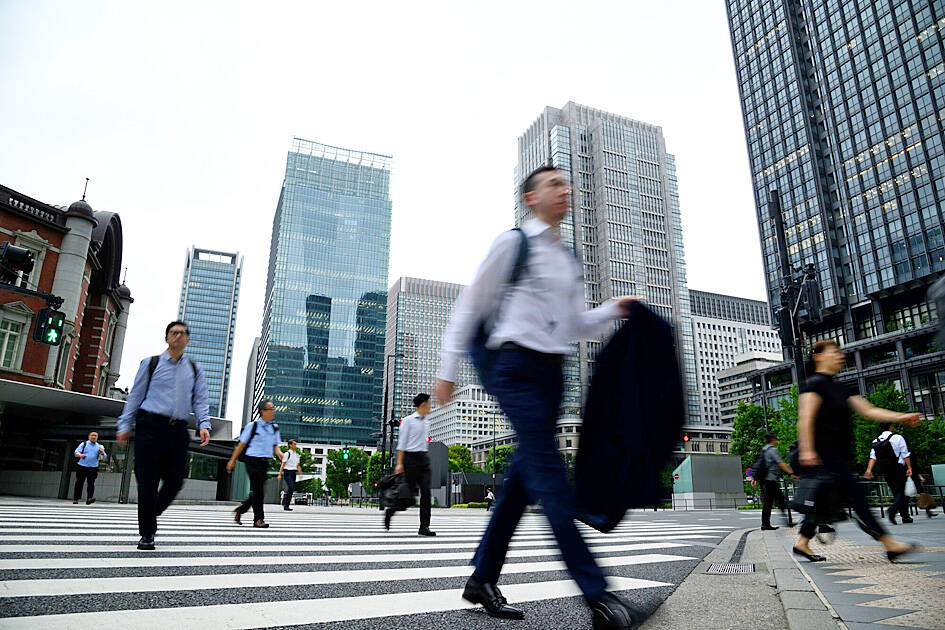Japan’s economy expanded in the second quarter at a pace slightly slower than the government’s initial estimate, while still advancing enough to keep the Bank of Japan (BOJ) on track to raise interest rates later this year.
Japan’s GDP grew at an annualized pace of 2.9 percent in the three months through June compared with the previous quarter, the Japanese Cabinet Office said yesterday.
The result compared with a preliminary estimate of 3.1 percent. Private consumption and capital investment were both revised a tad lower.

Photo: Bloomberg
In non-inflation adjusted terms, the economy advanced 1.8 percent from the previous quarter, and the data reaffirmed that the total value of the economy exceeded ¥600 trillion (US$4.18 trillion) for the first time on record, a goal set a decade ago by policymakers.
While the key domestic demand components were slightly downgraded, the overall results broadly support BOJ Governor Kazuo Ueda’s view that a gradual recovery would continue.
The central bank would conclude its next policy meeting on Friday next week, with the focus likely to fall on the prospects for another rate increase next month or in December after the latest hike to 0.25 percent in July.
Yesterday’s data confirmed that consumer spending grew 0.9 percent from the previous quarter in a sign of a recovery after it fell for four consecutive quarters through the end of March.
Concerns over cost of living and consumer demand would be on the minds of politicians vying to become Japan’s next prime minister. The ruling Liberal Democratic Party’s (LDP) Sept. 27 leadership election is all but certain to determine Japanese Prime Minister Fumio Kishida’s successor due to the party’s dominance in parliament.
LDP Secretary-General Toshimitsu Motegi, one of several candidates running in the party race, last week said he would compile an economic package if he wins the vote.
Shinjiro Koizumi, one of the frontrunners in the leadership race, has also pledged to unveil a package should he become prime minister.
With the likelihood that demand from China and the US might cool as economic growth slows, Japan’s consumer spending would be critical going forward, Norinchukin Research Institute chief economist Takeshi Minami said.
“Consumer spending may get stronger as wages are starting to rise,” he said. “At the same time, a recent rise in prices for rice and food may keep households in a saving mode.”

BIG BUCKS: Chairman Wei is expected to receive NT$34.12 million on a proposed NT$5 cash dividend plan, while the National Development Fund would get NT$8.27 billion Taiwan Semiconductor Manufacturing Co (TSMC, 台積電), the world’s largest contract chipmaker, yesterday announced that its board of directors approved US$15.25 billion in capital appropriations for long-term expansion to meet growing demand. The funds are to be used for installing advanced technology and packaging capacity, expanding mature and specialty technology, and constructing fabs with facility systems, TSMC said in a statement. The board also approved a proposal to distribute a NT$5 cash dividend per share, based on first-quarter earnings per share of NT$13.94, it said. That surpasses the NT$4.50 dividend for the fourth quarter of last year. TSMC has said that while it is eager

‘IMMENSE SWAY’: The top 50 companies, based on market cap, shape everything from technology to consumer trends, advisory firm Visual Capitalist said Taiwan Semiconductor Manufacturing Co (TSMC, 台積電) was ranked the 10th-most valuable company globally this year, market information advisory firm Visual Capitalist said. TSMC sat on a market cap of about US$915 billion as of Monday last week, making it the 10th-most valuable company in the world and No. 1 in Asia, the publisher said in its “50 Most Valuable Companies in the World” list. Visual Capitalist described TSMC as the world’s largest dedicated semiconductor foundry operator that rolls out chips for major tech names such as US consumer electronics brand Apple Inc, and artificial intelligence (AI) chip designers Nvidia Corp and Advanced

Saudi Arabian Oil Co (Aramco), the Saudi state-owned oil giant, yesterday posted first-quarter profits of US$26 billion, down 4.6 percent from the prior year as falling global oil prices undermine the kingdom’s multitrillion-dollar development plans. Aramco had revenues of US$108.1 billion over the quarter, the company reported in a filing on Riyadh’s Tadawul stock exchange. The company saw US$107.2 billion in revenues and profits of US$27.2 billion for the same period last year. Saudi Arabia has promised to invest US$600 billion in the US over the course of US President Donald Trump’s second term. Trump, who is set to touch

SKEPTICAL: An economist said it is possible US and Chinese officials would walk away from the meeting saying talks were productive, without reducing tariffs at all US President Donald Trump hailed a “total reset” in US-China trade relations, ahead of a second day of talks yesterday between top officials from Washington and Beijing aimed at de-escalating trade tensions sparked by his aggressive tariff rollout. In a Truth Social post early yesterday, Trump praised the “very good” discussions and deemed them “a total reset negotiated in a friendly, but constructive, manner.” The second day of closed-door meetings between US Secretary of the Treasury Scott Bessent, US Trade Representative Jamieson Greer and Chinese Vice Premier He Lifeng (何立峰) were due to restart yesterday morning, said a person familiar